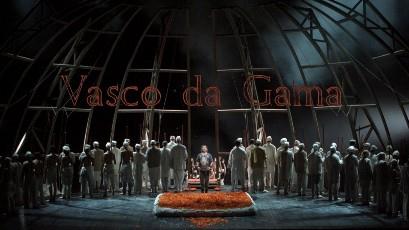Giacomo Meyerbeer - Vasco da Gama (Berlin 2015)
Giacomo Meyerbeer - Vasco da Gama (Berlin 2015)

1. Part 1 2. Part 2 3. Part 3 Don Pedro, Rat des Königs von Portugal - Seth Carico Don Diego, Admiral - Andrew Harris Ines, dessen Tochter - Nino Machaidze Vasco da Gama, Seeoffizier -Roberto Alagna Don Alvar, Ratsherr, Paul Kaufmann Der Großinquisitor - Dong-Hwan Lee Nelusco, Sklave - Markus Brück Selica, Sklavin - Sophie Koch Der Oberpriester der Brahmanen - Albert Pesendorfer Anna - Irene Roberts 1. Matrose - Matthew Peña 2. Matrose - Gideon Poppe 3. Matrose - Thomas Lehman 4. Matrose / Gerichtsdiener - Michael Adams Chor der Deutschen Oper Berlin Orchester der Deutschen Oper Berlin Enrique Mazzola - conductor
Giacomo Meyerbeer’s opera Vasco da Gama is known as L’Africaine. The composer worked on the score under the former title, but a year after his death the opera premiered in Paris as L’Africaine, and since then it has been staged under that name. The Deutsche Oper Berlin has now returned to Meyerbeer’s title of choice.
Giacomo Meyerbeer is a pivotal composer in the history of 19th-century opera, an authentic reference in French Grand Opera. Despite that, he has been largely forgotten in the past 50 years, and there have been few opportunities to see his works. One might think that a resurrection of Meyerbeer’s operas would have to come from France, and more specifically from the Paris National Opera, but that hasn’t happened. Apart from a few initiatives, including this year Les Huguenots in Nice and La Juive in Lyon and Munich, only Berlin’s Deutsche Oper is truly committed to producing Meyerbeer’s oeuvre. Last year they offered a concert version of Dinorah, and this year it’s the turn of L’Africaine/Vasco da Gama, in a new production and featuring an excellent cast. There are plans to offer Les Huguenots and Le Prophète over the next two years, which is great news.
L’Africaine was performed two years ago at La Fenice (with Gregory Kunde as Vasco de Gama), but there is a big difference between the operas offered in Venice and here in Berlin. La Fenice did a rather short version with under 3 hours of music. The Berlin opera is much more complete; although it is not the full version, it has almost one more hour of music than in Venice. I would say that the complete opera would run some 40 minutes longer.
Vera Nemirova’s attractive staging involves some ingenious sets. In the first act we see a wall with a world map which, in the scene of the Council and those that follow, becomes the floor where the action takes place. Some large curved panels act as sails for the boat and also serve to close the stage in the last acts. The action is brought up to modern times, which sometimes becomes strange but doesn’t interfere with one’s enjoyment. The costumes are attractive for both Westerners and the supposed African inhabitants.
The stage direction includes some debatable personal touches by Vera Nemirova, but it works as a whole and respects both libretto and score. In the opening scene there are a number of paper boats which appear to represent the dreams of Inès, who is in love with Vasco. The most original twist came at the start of the third act, in the middle of the trip to the Indies, with the wedding of Inès and Don Pedro. There’s a chorus of women dressed in a comical fashion and a few nuns, and Selica wears a nun’s habit. What the nuns were doing on the boat is beyond my understanding, but it was fun. The last two acts work well, with videos incorporated in the final scene.
Enrique Mazzola led the concert version of Dinorah a year ago, and his conducting of Vasco da Gama was effective and convincing. It lacked great inspiration in the more intimate passages, but the ensembles, so important in Meyerbeer’s operas, were always faultless. The orchestra gave a remarkable performance, and the chorus, one of the best in the world, was also superb.
Roberto Alagna as Vasco da Gama sang with devotion and conviction throughout the performance. There had been warnings of illness in past performances, but that didn’t happen here. However, I found Alagna uncomfortable on the high notes, which gave the impression that he was not in his best voice. He hit all these notes but not with his usual clarity, and he cut them short. In any case, it was a luxury to have him here.
French mezzo soprano Sophie Koch was Selica. She has an important, well-pitched voice in the middle and a good dose of expressiveness, and is easy and appealing on stage. Ms. Koch exhibited some weakness at the top notes: she’s a pure mezzo soprano, and Selica falls midway between the two voices.
Nino Machaidze sang the part of Inès, and I liked her better in the role than Jessica Pratt in Venice. The dark timbre of the Georgian soprano makes her nicely suited to the character, but I’ve always found her somewhat shrill at the top, and this was the case here.
Markus Brück was an outstanding Nelusko. This baritone appears often at the Deutsche Oper, and he is always marvelous. He doesn’t often perform outside Germany, which is a shame. He has an attractive voice and sang with gusto ̶ a magnificent interpreter.
In the secondary roles, Andrew Harris was a modest Don Diego. Seth Carico was convincing on stage, but his voice showed little interest on the part of Don Pedro. Tenor Clemens Bieber was good as Don Alvar, and Irene Roberts did fine in the part of Anna. Dong-Hwan Lee fell short as the Inquisitor, and the High Priest of Alexei Botnarciuc was not particularly interesting. ---José M. Irurzun, seenandheard-international.com
download (mp3 @224 kbs):
yandex 4shared mega mediafire zalivalka cloudmailru uplea








